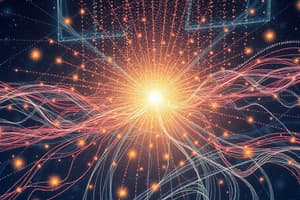Podcast
Questions and Answers
What characteristic of electromagnetic waves allows them to propagate through a vacuum?
What characteristic of electromagnetic waves allows them to propagate through a vacuum?
- They consist of oscillating electric and magnetic fields. (correct)
- They require a physical medium.
- They are produced by static electric charges.
- They are longitudinal waves.
Which type of motor uses alternating current for its operation?
Which type of motor uses alternating current for its operation?
- DC series motor
- Compound-wound DC motor
- Shunt-wound DC motor
- AC induction motor (correct)
What does Faraday's law of induction state?
What does Faraday's law of induction state?
- A changing magnetic field induces an electromotive force. (correct)
- A steady magnetic field induces an electromotive force.
- Only stationary magnetic fields can induce current.
- A changing electric field induces a magnetic field.
Which of the following statements about the electromagnetic spectrum is true?
Which of the following statements about the electromagnetic spectrum is true?
What is the role of the prime mover in a generator?
What is the role of the prime mover in a generator?
How is motor efficiency defined?
How is motor efficiency defined?
Which aspect affects the torque produced by a motor?
Which aspect affects the torque produced by a motor?
What determines the type of current produced by an electric generator?
What determines the type of current produced by an electric generator?
Which statement accurately describes the relationship between frequency and energy in electromagnetic waves?
Which statement accurately describes the relationship between frequency and energy in electromagnetic waves?
What is a primary advantage of brushless DC motors over brushed DC motors?
What is a primary advantage of brushless DC motors over brushed DC motors?
Which of the following types of electromagnetic waves is typically used for communication?
Which of the following types of electromagnetic waves is typically used for communication?
In the context of electric motors, what does Fleming's left-hand rule determine?
In the context of electric motors, what does Fleming's left-hand rule determine?
What principle do electric generators utilize to convert mechanical energy into electrical energy?
What principle do electric generators utilize to convert mechanical energy into electrical energy?
Which type of electromagnetic wave has the highest frequency?
Which type of electromagnetic wave has the highest frequency?
Which of the following is an example of an application of X-rays?
Which of the following is an example of an application of X-rays?
What type of current do induction motors operate on?
What type of current do induction motors operate on?
Flashcards
Electromagnetic Waves
Electromagnetic Waves
Transverse waves that travel at light speed, made of oscillating electric and magnetic fields, and can propagate through a vacuum.
Electric Motors
Electric Motors
Devices that change electrical energy into mechanical energy by using the interaction of magnetic fields and electric currents.
Electric Generators
Electric Generators
Devices changing mechanical energy into electricity by rotating a coil in a magnetic field, inducing a voltage.
DC Motor
DC Motor
Signup and view all the flashcards
AC Motor
AC Motor
Signup and view all the flashcards
EMF (Electromotive Force)
EMF (Electromotive Force)
Signup and view all the flashcards
Prime Mover
Prime Mover
Signup and view all the flashcards
Faraday's Law
Faraday's Law
Signup and view all the flashcards
Electromagnetic Spectrum
Electromagnetic Spectrum
Signup and view all the flashcards
Wave-particle duality
Wave-particle duality
Signup and view all the flashcards
What does Fleming's left-hand rule describe?
What does Fleming's left-hand rule describe?
Signup and view all the flashcards
Brushless DC motor
Brushless DC motor
Signup and view all the flashcards
Induction motor
Induction motor
Signup and view all the flashcards
Faraday's Law of Induction
Faraday's Law of Induction
Signup and view all the flashcards
What creates a voltage in a generator?
What creates a voltage in a generator?
Signup and view all the flashcards
Output power of a motor
Output power of a motor
Signup and view all the flashcards
Study Notes
Electromagnetic Waves
- Electromagnetic waves are transverse waves that propagate through space at the speed of light.
- They are produced by accelerating electric charges and can travel through a vacuum.
- They consist of oscillating electric and magnetic fields that are perpendicular to each other and to the direction of wave propagation.
- The electromagnetic spectrum encompasses a wide range of frequencies and wavelengths, including radio waves, microwaves, infrared radiation, visible light, ultraviolet radiation, X-rays, and gamma rays.
- The energy of an electromagnetic wave is directly proportional to its frequency.
Motors
- Electric motors convert electrical energy into mechanical energy.
- They operate based on the interaction between magnetic fields and electric currents.
- A crucial component is a current-carrying conductor placed within a magnetic field. The interaction of these creates a force that makes the conductor spin.
- DC motors use direct current, while AC motors use alternating current.
- Different motor types include series wound, shunt wound, and compound wound (DC motors), and induction motors (AC motors). Each type has different characteristics and applications.
- The torque produced by a motor depends on the strength of the magnetic field and the current in the windings.
- Speed control methods are used to adjust the motor's output speed, often involving varying the voltage or current supply.
- Motor efficiency is a key consideration, relating to the ratio of output mechanical power to input electrical power.
Generators
- Electric generators convert mechanical energy into electrical energy.
- They function by rotating a coil of wire within a magnetic field, inducing a voltage difference across the coil's terminals.
- This process is governed by Faraday's law of induction, which states that a changing magnetic field induces an electromotive force (EMF).
- Generators commonly employ a rotating armature or a stationary armature, with the induced current produced and collected differently in each case.
- A critical component of generators is the prime mover, which provides the mechanical energy to rotate the armature. Prime movers can include turbines powered by steam, water, or wind.
- The output voltage and current of a generator can be controlled by adjusting the speed of rotation or the strength of the magnetic field.
- AC generators produce alternating current (AC), whereas DC generators produce direct current (DC).
- The efficiency of a generator, like a motor, is a crucial factor.
- Different generator types, such as synchronous generators and induction generators, have varying characteristics and applications.
Studying That Suits You
Use AI to generate personalized quizzes and flashcards to suit your learning preferences.




